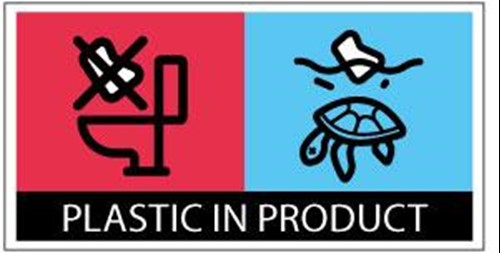You may have seen the new logo on our packs and been shocked or wondered what it’s all about. This new logo is part of the European Union Single-Use Plastic regulations and here’s exactly what that means to us as producers and to you, as a user of tampons, pads or liners.
To help reduce single-use plastic and its impact on the environment, the EU Commission have been busy writing new laws. The products targeted by these laws are those that most frequently end up on beaches and include wet wipes, tobacco products and filters, drink cups and period products like pads, tampons and liners.
The whole idea is to help make you more aware of the presence of plastic in these products and the impact of disposing of them incorrectly.

If these products contain any plastic, are single-use (not reusable) and are sold in an EU country, they must now show this new logo on their packaging. The EU has been very strict about its definition of plastic and not only includes the materials we traditionally think of as plastic (which are made from oil) but also some materials that are made from biofuels (from plants) and which might also be biodegradable e.g., films made from potato or corn starch. This means that even some products that you may consider “eco-friendly” will need to have the logo on their packaging.
We believe that education is key to enabling you to make the right choices. Here at Lil-Lets we feel passionately about being transparent, so you can feel comfortable and confident in our products and for this reason we’re supportive of adding the single-use plastic logo to our packaging.
Whilst many of us know not to flush period products down the toilet we estimate that in the UK alone, 247 million pads and tampons are flushed every year*! Lil-Lets champions responsible disposal of period products. So, in addition to the do not flush information we already put on our packs and products, we’re seeing the single use plastic logo as another bold reminder to ‘be a binner, not a flusher’.
Over the years there have been plenty of developments in intimate care products and in a lot of cases, plastics have been utilised to make them perform better – for example, materials like polythene and polyester are often used for the top cover of period pads as they are often better at ‘wicking away’ fluid than materials like cotton. This results in a ‘less wet’ feeling when wearing, just like gym clothing, which has changed from cotton to high tech materials, to stop you feeling sweaty! Therefore, most intimate care products contain plastic and if they’re sold in an EU country, they will be adding this logo to their packaging.
Some brands might not have the logo to declare plastic in product if they only sell in the UK, this does not mean their products do not contain plastic. The UK government are yet to decide how they will use and implement the Single-Use Plastic guidelines, so watch this space and in the meantime, check the ingredients list.
Products that won’t need this marking are mostly reusable products like menstrual cups, period underwear and reusable applicators as they are not single-use. However, there are a few areas where it may be confusing, namely ‘eco’ or for some organic products. For example, Lil-Lets non-applicator organic tampons are 100% cotton, so they won’t have the logo but our organic pads and liners will because they have a backing and wrapper that is made from cornstarch (a bioplastic). Even though cornstarch is made from plants and is totally biodegradable and compostable, the definition of a ‘plastic’ in the regulations includes materials like this one.
Lil-Lets are continually looking out for guidance and insight from industry, environmental and regulatory experts to understand the alternatives to the plastic we currently use in our products and packaging. We are busy working on a few projects now, focusing firstly on our range of non-applicator tampons.
If single use tampons and pads are your preferred choice, our organic non-applicator tampons are 100% certified organic cotton and contain no plastic and our organic pads and liners are majority cotton, containing less than 16% biodegradable plastic, which is made from plants.
*IRI HBA/OTC, UK Lil-Lets Sanitary Protection Market, Pads & Tampon sales, Volume sales, 52 w/e 15th May 2021. Total IRI Household UK. Figures based on a Lil-Lets consumer panel trial of over 200 women, in which 46% said they flush tampons and 1.3% said they flush pads.